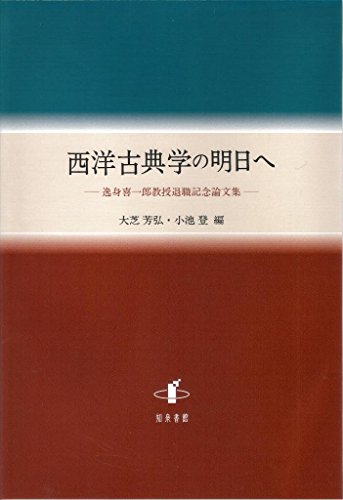15 0 0 0 彙報 『古代ラテン語集成』(TLL)国際協力委員会報告
- 著者
- 大芝 芳弘
- 出版者
- 日本學士院
- 雑誌
- 日本學士院紀要 (ISSN:03880036)
- 巻号頁・発行日
- vol.66, no.3, pp.137-145, 2012-03
4 0 0 0 西洋古典学の明日へ : 逸身喜一郎教授退職記念論文集
3 0 0 0 OA 黄金の枝と黄金時代
- 著者
- 大芝 芳弘
- 出版者
- 日本西洋古典学会
- 雑誌
- 西洋古典學研究 (ISSN:04479114)
- 巻号頁・発行日
- vol.32, pp.79-90, 1984-03-29
It is the purpose of this paper to explore the symbolic meaning of the golden bough and the golden age of Augustus, both of which appear in Aeneid 6, with regard to the theme of labor of Aeneas, and to consider the relation between them and some aspects of the significance of the καταβασι&b.sigmav;. The gold of the golden bough seems to be a symbol of divine life. But just as the luxuriant growth of the forests, itself a manifestation of nature's vitality, covers the bough in the dark shadows(136, 138-9)which bear resemblance to the darkness of the underworld, so the bough casts a shadow on the life-giving earth(195-6). Life is always attended by the shadow of death. Therefore the mistletoe-simile (205-7) makes it certain that the idea in primitive belief is transferred to the bough that life and death are both aspects of a single reality and the mistletoe is a symbol of such a union. But because the gold is associated with divinity, the golden bough may be said to be an eternal embodiment of that reality. Hence the bough belongs to both heaven (Iuppiter) and hell (Iuno Inferna) and achieves agreement between them, which enables Aeneas to undergo an experience of death and rebirth. And it also indicates Aeneas' pietas which brings about a harmony of man with the gods. Moreover, it is described as though it has its own strength (virtus) to conquer the powers of death and war (represented by ferruwi) which do not meet fate's wishes (147-8). Thus the golden bough symbolizes Aeneas' own character and shows that because of his being a divine man ofpietas and virtus he can overcome the labor of death and be restored to new life as a Roman hero. The golden age of Augustus is compared with that of Saturn(792-4). But the Saturnian age of peace could not withstand the invasion of the warlike iron age of Iuppiter(8.314ff). And it is implied in the expression 'aurea condet/saecula…… rursus…/…quondam…' that Augustus will replace Saturn as a representative of Iuppiter and that the new golden age will surpass the old. For Augustus will have the strength to vanquishfuror impius typical of Iuno as an opponent to the fate of Iuppiter, because the word 'asper' in 'aspera saecula' (1.291) suggests Iuno's influence. The expansion of imperium (6.794-805) will also depend on this strength (virtus), which is here exemplified by Hercules who suffered many labores because of 'fatis Iunonis iniquae' (8.292)but conquered her furor embodied in the hellish monsters such as Cacus. Similarly, Aeneas in the second half of the poem is involved in the war caused by Iuno, but he not only exerts his virtns but also keeps a pious attitude towards her and at last prevails to make her reconciled with Iuppiter. Therefore the golden age of Augustus together with the imperium can be said to be a peaceful order having fighting force, or rather a harmonious union of peace and war, which reflects a concord between Iuppiter and Iuno, achieved through labores of the divine man of pietas and virtus. Now it is clear that both the golden bough and the Augustan golden age stand for a harmonious union of opposites, the former of life and death, the latter of peace and war, and both of Iuppiter and Iuno. And it is also indicated in both that the labor is not a mere suffering but an indispensable exertion by which a divine man of pietas and virtus can attain 'rebirth' of new life or of a stable order of peace. Thus the labor of the κταβασι&b.sigmav;, at the center of the poem, making a pivotal point of this theme, relates beforehand the labores of the succeeding story and those for the historical ideal in terms of life and death.
- 著者
- 大芝 芳弘
- 出版者
- 日本西洋古典学会
- 雑誌
- 西洋古典學研究 (ISSN:04479114)
- 巻号頁・発行日
- vol.51, pp.141-144, 2003-03-20
2 0 0 0 OA 古代ギリシア正義論の欧文総合研究-プラトン『国家』とその伝統-
古代ギリシアにおける「正義」概念を明らかにし、現代社会の諸問題に応える目的で、プラトン『国家』(ポリテイア)を共同で検討した。その研究成果は、将来まとめて欧文研究書として海外で出版することを目標に、国際学会や研究会で報告され、欧文論文として海外の雑誌・論文集に発表されている。2010年夏に慶應義塾大学で開催された国際プラトン学会大会(プラトン『国家』がテーマ)では、メンバーが運営と研究の中核として、内外の専門家と共同で研究を推進した。
- 著者
- 大芝 芳弘
- 出版者
- 日本西洋古典学会
- 雑誌
- 西洋古典学研究 (ISSN:04479114)
- 巻号頁・発行日
- vol.55, pp.149-151, 2007-03-16 (Released:2017-05-23)



